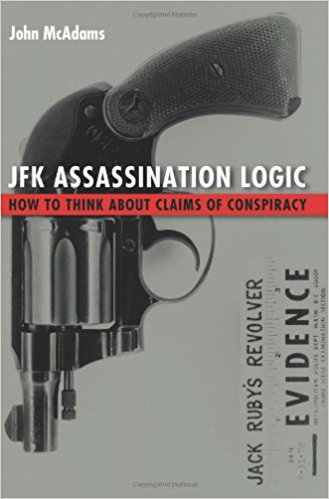 JFK Assassination Logic: How to Think about Claims of Conspiracy by John McAdams, Potomac Books, 2011.
JFK Assassination Logic: How to Think about Claims of Conspiracy by John McAdams, Potomac Books, 2011.
did (it was cheap but reliable), why he went to Mexico City (to get a Cuban visa, something he couldn’t do in the US), and on and on and on. I’ve read pro-conspiracy and anti-conspiracy books. I’ve even read Stephen King’s massive 11/22/63. (That’s not a recommendation, although I will say that I was so drawn into it that I read it in 2 1/2 days, all 800+ pages of it, in the midst of preparations for a big dinner party.) Last year I read A Cruel and Shocking Act: The Secret History of the Kennedy Assassination by Philip Shenon, which delves into the workings of the Warren Commission and is truly fascinating. Now I’ve read this one. and it should probably be the last one for a good while.
The book was well worth reading because, like Shenon’s, it has a different perspective from the ones that examine the assassination itself. As the title says, its purpose is to explain the best way to think about this tragedy, and, by extension, about any event with claims of conspiracy connected with it. How do you decide if a witness’s story is credible? How do you construct a scenario to fit various theories and then examine their likelihood? McAdams is especially clear in explaining the role of ad hoc assumptions, that is, the premises that we assume to be true before we ever start looking at the evidence. And we all make that type of assumption, to a greater or lesser degree. There is no such thing as a totally objective observer. There can, however, be an observer with an open mind who has an opinion but who looks at the evidence critically and is willing to change his mind.
McAdams also brings in the “principle of parsimony,” sometimes called “Ockham’s Razor,” (named after William of Ockham, a 14th-century friar, philosopher and theologian), the idea that, most of the time, the simplest explanation is the correct one. (The “razor” refers to “shaving away” unnecessary assumptions or “cutting between” two similar conclusions.) The principle doesn’t say that the simplest explanation is always correct, just that it usually is. And, if you think about it, isn’t it always better to start with the simplest explanation or the easiest remedy and work your way up if the starting idea doesn’t work? A lot of time, money and effort could be saved if we always did things that way. But humans always want to complicate things. We think, “There must be more to it than that,” and sometimes there is. Albert Einstein famously said, “Things should be made as simple as possible, but not simpler.” McAdams doesn’t gloss over the unanswered questions or conflicting reports; there are always such issues, even in the most straightforward event. But when all is said and done, there it is: Oswald did it, and he did it alone. We can all quit speculating.
So, if you’d like to read a JFK book that uses common sense and logic as its guiding principles, this is the book for you. And if its imminent sanity spills over into other issues in your life or mine, so much the better.